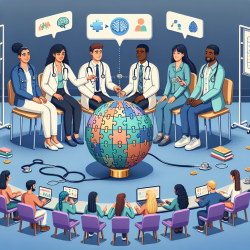In April 2022, a team of mental health professionals from the UK visited India to explore opportunities for collaboration, research, and exchange in the field of psychiatry. This initiative, which started with two NHS organizations, has now expanded to over 20 organizations across England and Wales. This collaborative effort aims to share knowledge, conduct research, and address challenges in mental health care, particularly focusing on issues such as ADHD, substance use disorders, and the integration of community mental health services.The symposium, "Indo-UK Collaboration – the way forward," presented by leading experts, offers valuable insights into developing sustainable partnerships and addressing mental health challenges through collaborative efforts. Here are some key takeaways for practitioners:
1. Developing Sustainable Partnerships
Dr. Aamer Sajjad, Consultant Psychiatrist and Medical Director at NAViGO Health and Social Care CiC, UK, emphasized the importance of creating a framework for long-term sustainable partnerships. This involves establishing clear communication channels, setting mutual goals, and ensuring continuous engagement between collaborating organizations.
2. Advancements in Clinical Research
Dr. Samir Kumar Praharaj, Professor and Head of the Department of Psychiatry at Kasturba Medical College, Manipal, India, highlighted recent advances in clinical research in both India and the UK. These advancements include innovative treatment strategies and the integration of new technologies in mental health care.
3. Addressing ADHD in Adults
The symposium on Adult ADHD, led by a specialist team from the UK, underscored the importance of accurate diagnosis and management of ADHD in adults. The prevalence of ADHD in adults is estimated to be 2 to 4%, with many cases being misdiagnosed. Effective treatment can significantly improve the quality of life for individuals with ADHD, reducing the risk of secondary mental health problems and improving overall functioning.
4. Substance Use Disorders and Family Dynamics
The symposium on substance use disorders, presented by experts from the Department of Psychiatry and NDDTC at AIIMS, New Delhi, explored the interaction between families and individuals with substance use disorders. The discussion highlighted the importance of family involvement in therapeutic interventions and the positive impact of supportive family dynamics on treatment outcomes.
5. Neurobiological Underpinnings of Behavioral Addictions
The symposium on Internet Gaming Disorder (IGD) examined the neurobiological underpinnings of behavioral addictions. The findings suggest that IGD may need to be conceptualized as a combination of impulsivity and compulsivity dysfunctions. Understanding these mechanisms can refine management strategies and improve treatment outcomes for individuals with behavioral addictions.
6. Psychotherapy and Psychotropic Drug Treatment
The symposium on psychotherapy and psychotropic drug treatment addressed the neurobiological and psychodynamic perspectives of healing. Dr. Shree Vinekar and Dr. Sudhakar Madakasira discussed the transformative power of psychotherapy, yoga, and meditation in reshaping cognition and brain function, as well as the importance of psychodynamic factors in improving treatment outcomes.
7. Community Engagement in Mental Health
The symposium on community mental health services in India, presented by experts from the state of Haryana, emphasized the importance of delivering mental health services at the community level. The discussion highlighted the challenges and future prospects of community psychiatry in India, focusing on the need for resource development and community-based interventions.By implementing the outcomes of these research findings and collaborative efforts, practitioners can enhance their skills, improve treatment outcomes, and contribute to the overall advancement of mental health care. For further insights and detailed research findings, practitioners are encouraged to read the original research paper:
ABSTRACTS FOR SYMPOSIA.
